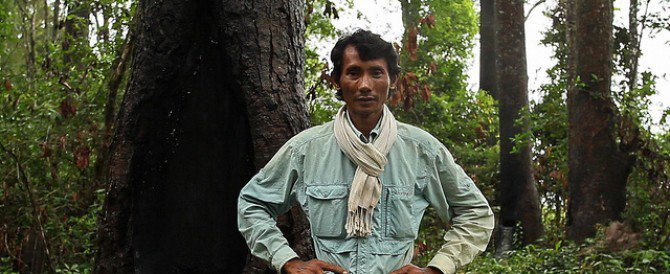On the day of his murder, April 26th 2012, environmental investigator and activist Chut Wutty was showing journalists an illegal logging operation in Cambodia’s Koh Kong province. An altercation ensued and a military police officer shot Wutty dead. A logging company security guard then apparently tried to disarm the officer who ended up being shot dead too (another version of the official story has the officer turning the gun on himself in remorse).
The media has highlighted that the subsequent investigation was ‘riddled with irregularities’. There was little or no analysis made of the murder site – no fingerprints taken, gunpowder analysis, wound trajectories or bullet casings – and key witnesses were absent when the case was assessed in court. The security guard served a few weeks in jail for the ‘unintentional murder’ of the policeman, while Wutty’s killing went unpunished.
Global Witness’ latest report, Deadly Environment, was published this April as Wutty’s supporters prepared to make a pilgrimage to the site of his death. It was Wutty’s murder that first inspired the research behind the report, which sought to document the killings of citizens around the world as they defend their land, forests and rivers against state or corporate use and misuse.

The work of forest and land defenders like Wutty is becoming ever more deadly. As we assembled comprehensive records from around the world, we found that at least two forest and land defenders are being killed per week. Some were environmental protesters; others were just ordinary people living on a desirable plot of land.
There has been a significant upturn in killings in recent years. With 147 documented killings, 2012 was the deadliest year yet. Significant limitations on information mean that these figures can only be conservative – it is likely that many more such crimes are going undocumented.
Wutty’s story finds echoes across continents, from assassinations at Amazonian forest frontiers to militia shootings at a dam in Sudan. His demise brings into sharp focus the secrecy, corruption, violence, crime and impunity that marks the collision between local livelihoods, environmental protection and powerful vested interests.
In Cambodia, state-sanctioned land grabbing has escalating at an alarming rate. Almost three quarters of the country’s arable land has been leased to investors since 2008, mostly taken from small-scale farmers and indigenous communities. Those affected are rarely consulted or compensated, and violent forced evictions are commonplace. In the first few months of 2014 alone, new seizures have impacted upwards of 2000 families, contributing to Cambodia’s current total of over half a million conflicts over land.
Wutty’s work exposing illegal logging for over a decade meant he was no stranger to death threats. He had worked in the past with Global Witness and others to bring to light the violence and graft that underpins the country’s land and forest sector, and the businessmen and politicians who get rich from it. He often physically confronted what he saw as military occupation of customary land, and regularly got involved in community-led law enforcement initiatives, supporting people to champion their rights to the land and forests their livelihoods depended on.
Just weeks after Wutty’s murder, a 14 year-old girl was shot and killed by military police amidst a land dispute between her community and a rubber plantation company. Within months, a journalist investigating timber cartels was found brutally murdered in the boot of his car. Neither case has ever been investigated by the authorities. Instead, Cambodia saw a 144 per cent increase in the arrest of citizens protesting over land and housing issues between 2011 and 2012.
Impunity was Deadly Environment’s most common denominator, with only one per cent of perpetrators convicted globally for the deaths of environmental and land defenders between 2002 and 2013. By failing to monitor abuses and ensure that those responsible are brought to justice, our governments are implicitly granting license to future violence.
The final showdown between Wutty, a soldier and hired guard that Cambodia has committed to history bears all the hallmarks of a cheap cover-up, but there is something deeply symbolic in the confrontation between state, business and citizenry that it embodies. The struggle for human rights is, as it ever was, pitched against powerful forces. But as industry edges ever deeper into nature, the environment is increasingly becoming both a battleground for that struggle, as well as its silent victim.